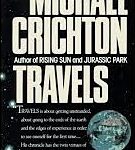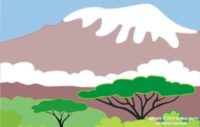After climbing Kilimanjaro, I had to acknowledge that I was mentally and physically tough. I was forced to redefine myself. [It] was the hardest thing I had ever done…but I had done it.
“I had defined myself too narrowly”
 In his wonderful book Travels (1988), author and director Michael Crichton describes his ascent of Mt. Kilimanjaro. The five-day climb (three up, two down) turned out to be the greatest physical challenge of his life. By the second day, he was already battling horrible blisters, altitude sickness and exhaustion. His guides felt that he would never make it to the summit.
In his wonderful book Travels (1988), author and director Michael Crichton describes his ascent of Mt. Kilimanjaro. The five-day climb (three up, two down) turned out to be the greatest physical challenge of his life. By the second day, he was already battling horrible blisters, altitude sickness and exhaustion. His guides felt that he would never make it to the summit.
Crichton struggled, both physically and mentally, walking in pain and doubting his ability to reach the top. At one point, a doctor who was in his climbing party told Crichton his blisters were so bad that would have to return. Crichton refused. He pushed himself up the mountain, reached the summit and, in the process, awakened potentials that he had suppressed all his life:
What I learned [from climbing Mt. Kilimanjaro] was this: that I had defined myself as a person who didn’t like heights or cold, a person who didn’t like to be dirty, a person who didn’t like physical exertion or discomfort. And here I had spent five days cold, dirty, and exhausted; I had lost twenty pounds; and I had had a wonderful experience….I realized then that I had defined myself too narrowly….I had always secretly defined myself as a physically weak and somewhat sickly person. After climbing Kilimanjaro, I had to acknowledge that I was mentally and physically tough. I was forced to redefine myself. Climbing the mountain was the hardest thing I had ever done, physically, in my life, but I had done it (p. 168).
Transcending Perceived Limitations
By climbing Kilimanjaro, Crichton had unintentionally put himself into a situation that would force him to transcend what he believed were his limitations, to step outside of the life narrative he had written for himself. Afterward, he had no choice but to redefine who he was. The climb was for him a call to the adventure of the rest of his life. After Kilimanjaro, he began to try things he didn’t think he would like and to do things he didn’t think he could do.
The Journey to Redefinition
(Adapted from The Hero’s Journey: The Path of Transformation. Copyright Ⓒ by 2016 by Reg Harris. All rights reserved.)
